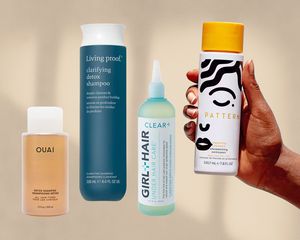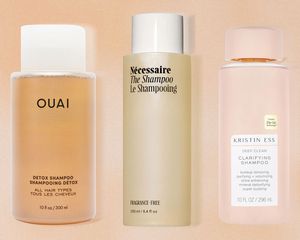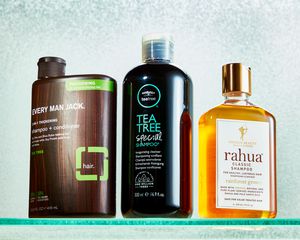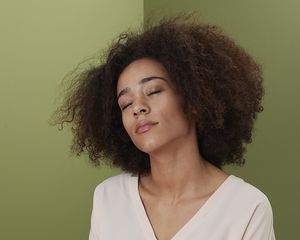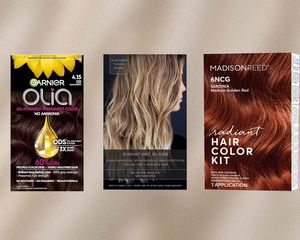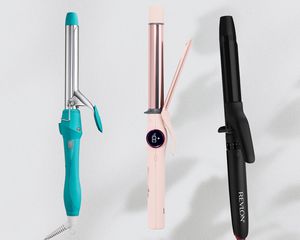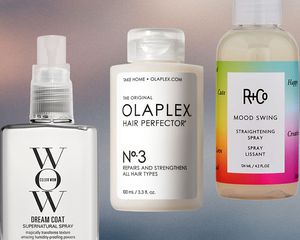:max_bytes(150000):strip_icc()/USED_apple-cider-vinegar-for-hair-1778-46cc1fa5d7484f5982d5d348d9257494.jpg)
Tawni Bannister for BYRDIE
Apple cider vinegar's health and skin-boosting benefits are renowned (why else would we take a shot of something so ... vinegary in the morning?) As it turns out, an apple cider vinegar hair rinse can elevate the health—and appearance—of your hair, too. Ahead, we talk to a dermatologist, a trichologist, and two hair experts about the many ways in which an apple cider vinegar (ACV) hair rinse can transform your strands and scalp.
Meet the Expert
- Gretchen Friese is a Bosley Professional Strength certified trichologist.
- Denis de Souza is a Joico celebrity colorist.
- Jo Blackwell-Preston is the founder and master stylist at Dop Dop Salon.
- Dr. Robert Finney is a board-certified cosmetic dermatologist and founder of Soho Skin and Hair Restoration.
What Is Apple Cider Vinegar?
"[Apple cider vinegar] is made by crushing apples, then squeezing out the juice," says trichologist Gretchen Friese. "Bacteria and yeast are added to the liquid to start an alcoholic fermentation process, which converts the sugars from the juice to alcohol. Then in a second and final fermentation step, the alcohol is converted into vinegar." Not only did they weigh in on ACV's beauty claims but they also dished on who could most benefit from adding it to their hair care routine—and how. So keep scrolling as we're bringing you everything you ever wanted to know about apple cider vinegar for hair.
Apple Cider Vinegar for Hair
Type of ingredient: Anti-inflammatory
Main benefits: Clarifies, detangles, and stimulates a healthy scalp
Who should use it: Anyone with product buildup or an overly-oily or dry scalp
How often can you use it: As a general rule of thumb, use once per week (although this can vary depending on the product formulation and your hair type).
Works well with: Moisturizing masks
Don’t use with: Scalp scrubs or other chemical/physical exfoliants to avoid irritation
Benefits of Apple Cider Vinegar for Hair
Apple cider vinegar is to hair what honey is to green tea. You don't necessarily need it, but try it once and you (likely) won't go back. That's because ACV offers a host of potential benefits that all have one thing in common: making your hair and scalp look and feel amazing. Here's how:
- Promotes a healthy scalp: ACV may offer healing properties for the scalp. "The antibacterial and antifungal properties of ACV help to keep the pH level of the scalp balanced," says Friese. "Dandruff is a buildup on the scalp that happens when too much yeast is present on oily areas of the skin. Using a mix with ACV can help avoid that build-up."
- Reduces color fading: Friese says that for color-treated hair, ACV can help close the cuticles, thus maintaining your color's vibrancy.
- Detangles: If you have hair that's prone to knots or tangles, anecdotal evidence suggests that ACV and a wide-tooth comb can help rid them.
- Strengthens and softens: “Apple cider vinegar coats the cuticle, leaving the hair soft and shiny,” says celebrity colorist Denis de Souza. “It also helps to strengthen your hair by closing the cuticles and the hair shaft,” he adds.
- Fights frizz: Friese maintains that ACV can help smooth the hair and keep frizz at bay, making it a popular treatment option among those with curly and textured hair.
- Reduces hair loss: With its potential ability to balance the skin's pH and clear the hair follicle from debris, Friese says that ACV can help reduce hair loss.
- Cleanses: Apple cider vinegar may be effective at getting rid of buildup on the scalp without stripping color. "Apple cider vinegar rinses are about removing the buildup of products, and they make the hair really clean,” says master stylist Jo Blackwell-Preston.
Hair Type Considerations
Apple cider vinegar hair rinse is particularly beneficial for certain hair types. "People with dandruff or people who wash infrequently can benefit from ACV," says board-certified cosmetic dermatologist Dr. Robert Finney. "Basically ACV breaks down into AHAs to help exfoliate gently; it also has some inherent antimicrobial properties. So if you infrequently wash and have some buildup on your scalp, the AHAs can help."
Finney adds: "An overproduction of oil and or overgrowth of yeast contribute to dandruff, so the antimicrobial properties [of an apple cider vinegar hair rinse] can help. It can also help balance the pH of your scalp."
How to Use Apple Cider Vinegar for Hair
Because ACV is slightly acidic, when it's mixed with two to three parts water it may extend the life of hair color, but only when applied right after the color is rinsed off. "Most hair colors are alkaline, which opens up the hair cuticle, and applying an acidic solution may reseal the cuticle," notes Friese. You can experiment to find a dilution that works best for you and your hair type, but in general, the following steps are a good place to start:
- Mix five parts water to one part vinegar in a spray bottle (100 ml of ACV to 500 ml of water if you want to be exact).
- Spray your scalp well, enough that it'll be evenly coated.
- Work the vinegar into clean hair with your fingers. It will be diluted enough that it shouldn't burn.
- Allow the vinegar mixture to sit—for a very short time. "Let it sit for longer than five to ten minutes minutes and start slow," says Dr. Finney.
- Rinse your hair and scalp with cool water.
- Follow this rinse with a light conditioner, nothing that will weigh down your hair.
- Rinse your hair well, until you're sure all product (and vinegar) is down the drain.
Potential Risks
There are some potential risks for irritation when using an apple cider vinegar hair rinse— not to mention, the unpleasant smell. Dr. Finney says that using a homemade concoction, such as the one outlined above, is a cost-effective measure. However, he advises proceeding with caution.
"If you are using an at-home recipe with full-on ACV, I would start once a week and not ever do it more than two times a week," he says. "Overuse might cause dryness and irritation. Also appropriately dilute the ACV. If you don't, it will likely be irritating. It is also noxious."
The safest bet, according to Finney, is to steer clear of the D.I.Y. route if possible. "I prefer using a product where ACV is integrated into the formula appropriately," he notes. "If you pick the right product, it shouldn’t smell and can be used more consistently."
Apple Cider Vinegar Hair Rinse v. Clarifying Shampoo
Clarifying shampoos also remove buildup from the scalp, but how are they different from an apple cider hair rinse? According to Dr. Finney, the difference is somewhat negligible. "They both have the same goal: to remove excess buildup and oil to cleanse the hairs and scalp," he says. "ACV, if used right, is a great ingredient to do so for the aforementioned reasons. Overall, listen to your scalp and find the sweet spot for washing and conditioning."



